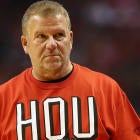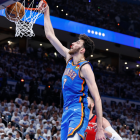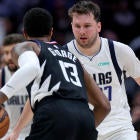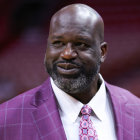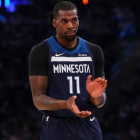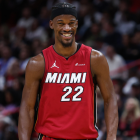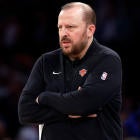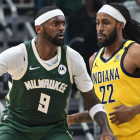The 2017-18 Houston Rockets were, by nearly any measure, a championship-caliber team. They won 65 games, had the NBA's best net rating and tore through their first two playoff series with an 8-2 record. They employed the NBA's MVP in James Harden, another All-Star in Chris Paul, and checked off virtually every box on the "this is their year" checklist. And then they ran into Stephen Curry, Kevin Durant and the Golden State Warriors. It may have taken them seven games, but it didn't matter that the Rockets were a historically dominant team. The Warriors took them down.
Fast forward a year. The rematch series is tied 2-2. Houston has most of its previous core in place alongside a few new faces. Golden State has lost Durant in a close Game 5. That had to be the time, right? Well, it wasn't. Curry carried the Warriors to yet another series victory over Houston. Throw in the 2015 Western Conference Finals, and arguably the three best Rockets teams of the past two decades were all slain by the Warriors.
But at 12-45, the Warriors have practically been mathematically eliminated from playoff contention. Kevin Durant is across the country in the Eastern Conference, and he isn't even expected to play a game this season. The boogeyman isn't waiting under Houston's bed any longer, and Rockets owner Tilman Fertitta was somewhat dismissive of the Western Conference contenders that have risen up to replace them in an interview with Kirk Bohls of Statesman. While he acknowledged Milwaukee's place as the championship favorite, he isn't afraid of the two juggernauts waiting in Los Angeles, and he doesn't think the rest of the league is either.
"None of us fear L.A. or the Clippers or Denver like we feared Golden State," he said. "It's not like how we were scared of them. We could easily win the West this year or get knocked out in the first round. Both L.A. teams, Denver, Houston, we're all excellent teams. Just comes down to somebody gets hot and makes a shot. Our chances are as good as they've ever been."
At the moment, the Rockets justifiably feel quite good about themselves. They are 8-2 in their past 10 games, and one of those losses came without Russell Westbrook. Their new small-ball alignment has them playing some of the best offensive basketball in the NBA, as lineups featuring new addition Robert Covington have scored a dominant 117.6 points per 100 possessions. For the season, lineups featuring P.J. Tucker at center, which is their new normal, have outscored opponents by 6.9 points per 100 possessions, per Cleaning the Glass.
And therein lies the problem. In building such a historically small roster, the Rockets have emphatically declared that they are not afraid of the Lakers or the Clippers. Instead, they have accidentally made a very different declaration: that they are still afraid of the Warriors. The Rockets, as currently constructed, are built to beat a team that no longer exists.
Houston's strategy against Golden State was tactically brilliant. Offensively, their plan was to shoot so many 3-pointers that the math would correct the talent imbalance between them and the Warriors. This approach very nearly succeeded in 2018, as Houston attempted 52 more 3-pointers across seven games than Golden State before infamously missing 27 in a row in Game 7. Many of those 3s were generated by aggressive switch-hunting. Harden would figure out who Curry was guarding, have that player set a screen for him, and then tire Curry out after the switch forced him to guard the ball.
That strategy was built on Houston's ironclad refusal to lose to Curry. Defensively, they switched nearly every screen. This had two effects: the obvious was ensuring Curry always had a man to contest his shots, even if the matchup wasn't ideal. The more subtle one again boiled down to math. Switching often left Durant guarded by smaller defenders, essentially goading him into shooting under the logic that an inefficient isolation jumper was never going to be as valuable as the sort of scheme-driven 3-pointers Curry destroys teams with. They intentionally created bad mismatches knowing that every shot Durant took was one that Curry didn't. As with their own shooting, the plan nearly worked. After a hot start, Durant shot only 39 percent in Games 3-6.
Playing that way requires an extreme degree of organizational commitment. That was evident in the NBA Finals, when the Cleveland Cavaliers toyed with similar concepts and were blasted in a four-game sweep with an average margin of victory of 15 points. So the Rockets signed shooters and wing defenders. They built their offense around isolations and switched relentlessly during the regular season. Houston poured all of its resources to playing that way because it was the only conceivable method of stopping what was perhaps the greatest basketball team ever assembled.
But most teams don't have Curry, Durant, Klay Thompson and Draymond Green at their disposal. This year's contenders feature a wide variety of playing styles and roster types, and winning this year's championship will likely require a degree of adaptability in handling all of them.
While the Lakers and Clippers may not be able to hit the peak of the Warriors with Durant, their depth provides critical optionality in combatting a variety of opponents. The Lakers usually play big, for instance, but can very easily go smaller by shifting some of the minutes dedicated to JaVale McGee and Dwight Howard to Kyle Kuzma or their guards. Doing so increases spacing without sacrificing too much size in the context of a Rockets matchup. Anthony Davis is more than comfortable enough on the perimeter to hold up against Houston, but the Rockets don't have anyone who can say the same inside against him. The Lakers will have a size advantage no matter what without sacrificing in the skill department.
The Clippers don't need a size advantage thanks to Kawhi Leonard and Paul George. Having a pair of two-way monsters of their caliber allows Doc Rivers unparalleled flexibility in building his own lineups. If he needs to score? Lou Williams, Montrezl Harrell and Landry Shamet can join those two to form a nearly unstoppable five-man unit. When protecting a lead is the priority, Rivers can turn to Patrick Beverley and Marcus Morris. Switching against the Clippers is practically pointless. Their offense is already driven by isolation and pick-and-roll creation. Switching just gives them matchup advantages. They won't need to switch against Houston, though. Leonard and George are more than comfortable negotiating screens in one-on-one defense.
And that says nothing of Denver or Utah. While neither can match the Los Angeles teams in top-end talent, they provide unique matchup problems of their own. Nikola Jokic averaged 25.1 points, 13 rebounds and 8.4 assists in the playoffs a year ago. What do those numbers look like against defenders half a foot shorter than him? Heck, with an All-Star guard of their own and two of the best volume shooters in the NBA this season in Joe Ingles and Bojan Bogdanovic, it's not inconceivable that Utah could beat Houston at its own game for stretches if Rudy Gobert continues to struggle in that matchup.
The Rockets could theoretically beat any of those teams. But odds are, they'll struggle against at least one of them. And when those struggles come, the Rockets don't have any tricks left up their sleeves. They have gone all-in on beating the kind of team that has made sport of beating them rather than the kinds of teams they are actually likely to face in the playoffs.
None of this necessarily precludes the Rockets from winning a championship. Despite everything, Houston's strategy is still mathematically sound. Regardless of matchup, layups and 3's are always going to be more efficient than post-ups. Switching, when done correctly with capable personnel, is the most effective method of defending most screens.
But no team has ever won four rounds on math alone. The mere fact that the Rockets aren't afraid of the Lakers and Clippers is precisely why they should be afraid of the Lakers and Clippers. They disregarded the two best rosters in their conference in building their own, and that makes them vulnerable to their competition in a way that they've never been in this era. The Rockets overcame their talent gap against the Warriors by playing a style suited to beating the Warriors, but playing a style suited to beating the Warriors does nothing to close the talent gap against the Lakers and Clippers, and without having taken any other steps to neutralize their dominant duos, the Rockets will enter the postseason at a severe disadvantage.













